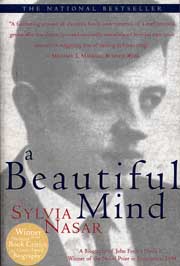Review of a Beautiful Mind
by Al Siebert, PhD

The story of Nobel prize winner John Forbes Nash, Jr. proves that psychiatrists are wrong about schizophrenia being a brain disease like Alzheimers and Parkinson's. The movie about Nash, a Beautiful Mind, starring actor Russell Crowe, is a misleading distortion of his story.
In his early twenties, Nash was internationally recognized as a mathematical genius. While in graduate school at Princeton University he developed a brilliant new economic model about the ways that people and groups reach bargaining agreements. His fame increased as he worked as a young professor and an associate at the Rand Corporation.
At the age of thirty, however, he developed delusions about getting messages from space and was diagnosed as having paranoid schizophrenia. In looking back at what happened, Nash says, "my ideas about supernatural beings came to me the same way my mathematical ideas did. So I took them seriously."
His wife, Alicia, had him involuntary admitted to a psychiatric hospital fro treatment half a dozen times in the 1960's, but after those experiences he adamantly refused further hospital treatment and medications. He described his insulin shock treatments as torture and the medications as making him "foggy." He was appalled at what he saw happening to mental hospital patients.
From that time on, he refused hospitalization, psychiatric treatment, and medications. He lost his teaching position and his job at Rand. For about ten years he drifted around the United States and Europe. Although Alicia divorced him, she always cared for him deeply and later invited him to move into her home near Princeton. For the next twenty years he walked the halls and corridors at Princeton, where he became known as the Phantom. At night he would write mathematical formulas and strange messages on blackboards. Faculty members and the administration at Princeton felt a benign, protective toleration for him. They told concerned students that Nash was a legendary genius who had "flipped out."
In the motion picture about Nash, a Beautiful Mind, actor Russell Crowe does a superb job acting out psychiatry's beliefs about schizophrenia. Director Ron Howard and actor Russell Crowe followed what the consulting psychiatrists think schizophrenia is. They did not seek input from John Nash, however, even though they shot the film at Princeton where Nash teaches. Crowe met Nash once during the filming when Nash walked by to see what they were doing.
Sylvia Nasar, author of a Beautiful Mind, her award winning book about Nash, says that the movie is "a fictionalized version" of her book. (Newsweek, March 8, 2002, p. 52.) The film distorts Nash's true story in two significant ways. One is that he never had hallucinations (featured prominently in the movie), he had delusions (of getting messages from space.)
Second, the movie incorrectly portrays him as controlling his symptoms by taking medications. The truth is that at the age of sixty, over thirty years after his mental breakdown, all traces of his so-called schizophrenia disappeared with no medications. Nash wrote in 1995, "Gradually I began to intellectually reject some of the delusionally induced lines of thinking that had been characteristic of my orientation." And in 1996, "I emerged from irrational thinking, ultimately, without medicine other than the natural hormonal processes of aging."
Nash resumed teaching university courses in mathematics, and was regarded by all as a fully recovered. With his sanity returned, the Nobel prize committee awarded him the Nobel prize in economics in 1994 for the brilliant contributions he made as a young man.
The well documented life of John Forbes Nash, Jr. shows that modern psychiatrists are wrong when they declare that schizophrenia is a brain disease like Alzheimer's, Parkinson's, or multiple sclerosis. Many people with schizophrenia do not progressively deteriorate if untreated. Just the opposite, most improve over time. Many people diagnosed with schizophrenia, like Nash, have recovered on their own without any treatment, something never accomplished by a person with Parkinson's, Alzheimer's, or multiple sclerosis.
The movie, a Beautiful Mind, is one more example of how psychiatry's delusions about schizophrenia continue to be spread, unchallenged, through our main stream culture.
Little known facts and information about people who become "weller than well" after recovering from so-called schizophrenia can be found elsewhere on this website.
top
![[Successful Schizophrenia logo, RETURN TO HOME PAGE]](../GRAPHICS/SSWDSMAL.GIF)